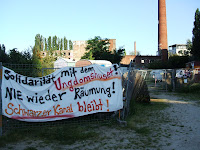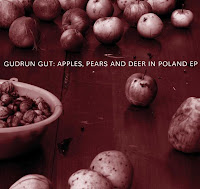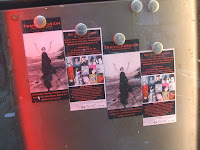The Girl Suite EP/
Girls and CitiesMoabit MusikAfter three editions of
Miasma, her collaboration with musician
Gudrun Gut, spoken word artist
Myra Davies steps out under her own name for a new full-length CD,
Cities and Girls, and an online taster, The
Girl Suite EP.
A gifted storyteller, Davies has a dry, knowing and stolidly North American delivery which contrasts sharply with her Europhile leanings. Whereas
Miasma explored themes of nature and gender, Davies now turns her eye to the shared culture of girls, working with a range of musical collaborators, including Gut, drawn from Berlin's experimental margins.
On the EP's standout track, “Valkyrie”, Davies celebrates “nine sisters with old German names” over Gut's remix of the operatic classic, “Ride of the Valkyries”. But in this telling, the "horsey girls" become great rebels, riding off on their steeds as the music fades, a Wagnerian nursery rhyme for the 21st century.
Curiously, that piece is omitted from the album, much of which harks back to an uncomfortable past: in “Burroughs' Bunker” Davies makes a visit to the poet's New York dwelling which reminds her of “1956 middle America”, and on “Calgary”, she turns to early 20th century folk songs from the USA and her native Canada.
“My Friend Sherry” is a strange mélange of doo-wop pop, sampled speech and Davies's recitation of a botched abortion leading to a friend's death in the 1960s. It's an ambitious undertaking to turn social commentary into a pop song which is part Four Seasons, part Shangri-Las, but Davies's voice, usually so supple and confident in its delivery, sounds curiously stiff, as if shoehorned into the pop idiom.
In a nod to
Miasma's quirky subject matter, “Worm” is a drawling, tongue-in-cheek consideration of the life cycle. Inspired by the sight of a worm stranded on a pavement, Davies draws the listener into her circular musings on
Jean Genet and Italian sailors, before returning to the plight of the humble creature, offering it solidarity.
Berlin, so long a source of inspiration for the Davies-Gut partnership, is notable by its absence. Only one piece, the ambient tone poem “Rain”, refers to it, and then only in the press notes. The casual listener would have no idea which city was the subject.
Berlin at least provides fruitful collaborations for the album. In addition to Gut, Davies gets musical backing from
Beate Bartel and the pairing of
Danielle de Picciotto and
Alexander Hacke, all of whom have connections with
Einstürzende Neubauten.
Bartel, Gut's former bandmate in
Mania D,
Matador and Neubauten, provides the music for “Hanoi”, a gentle observational tale of sitting in a café enjoying Vietnamese coffee, while watching humanity pass by on bicycles.
Considering their industrial pedigree, de Picciotto/Hacke's contribution, “STUFF”, is remarkably placid -- a bit of paper rattling, some playful fairground melodies and a few lines pilfered from “My Favourite Things” delivered in a freaky high voice.
Here, Davies delivers her wittiest performance, a comic riff on the human tendency to accumulate STUFF, always taking too much with no place to put it. Her solution to the problem of STUFF is to take it to the landfill because it's the natural conclusion of the production cycle: “Property isn't theft. It's slavery.”
Equally unsentimental is the album closer, the startling “Goodbye Belfast”, in which she bids farewell to an ancestral home she never really knew. Recalling a visit to some Northern Irish great aunts in 1982, Davies repeatedly calls up their attempts at comforting words (“Have a wee cup of tea; you'll feel better”), contrasting this with their unshakeable sectarianism and using this as a metaphor for a place caught in the past.
“Not my place, not my time, not my pain”, she concludes, bidding the city good luck in its quest to move beyond this stagnation.
Girls and Cities is out 26 September.
 Another double dose, as I took in two gigs in one evening, albeit just around the corner from one another. Missy magazine's relaunch was held at the ever-so-secretive West Germany, a venue which displays the abundant charm of a distressed dentist's waiting room, but books some fantastic acts. I was there to see opener Golden Disko Ship, having missed her gigs in London some months back. Time was of the essence as I wanted to check out Ich bin ein Berliner at SO36 later that night.
Another double dose, as I took in two gigs in one evening, albeit just around the corner from one another. Missy magazine's relaunch was held at the ever-so-secretive West Germany, a venue which displays the abundant charm of a distressed dentist's waiting room, but books some fantastic acts. I was there to see opener Golden Disko Ship, having missed her gigs in London some months back. Time was of the essence as I wanted to check out Ich bin ein Berliner at SO36 later that night. Then it was on to the fabled SO36, which I had never, ever visited. I found it surprisingly posy, as if one had wandered onto the set of the Blitz Club, ca 1983. Great sound and lights, though. I needn't have worried about time, because I was there early enough to see the opening acts, but I was keen to see Mona Mur and En Esch, who absolutely rocked. The live show very much lets the album off its leash, even if a lot of the music comes from a computer. They also had a live drummer, which helps. Mur is the quintessential show-woman, all aggression and blood lust, while guitarist Esch is an unusual mixture of menace and knock-kneed geekiness. Set-closer "Die Ballade vom Ertrunkenen Mädchen" was the icing on the cake.
Then it was on to the fabled SO36, which I had never, ever visited. I found it surprisingly posy, as if one had wandered onto the set of the Blitz Club, ca 1983. Great sound and lights, though. I needn't have worried about time, because I was there early enough to see the opening acts, but I was keen to see Mona Mur and En Esch, who absolutely rocked. The live show very much lets the album off its leash, even if a lot of the music comes from a computer. They also had a live drummer, which helps. Mur is the quintessential show-woman, all aggression and blood lust, while guitarist Esch is an unusual mixture of menace and knock-kneed geekiness. Set-closer "Die Ballade vom Ertrunkenen Mädchen" was the icing on the cake.














